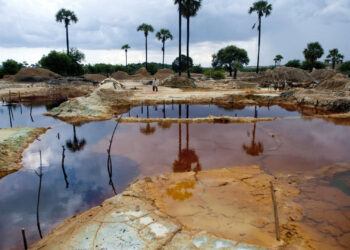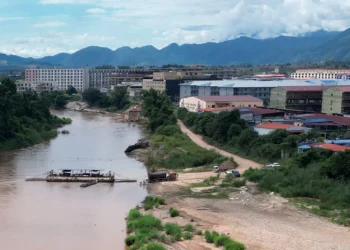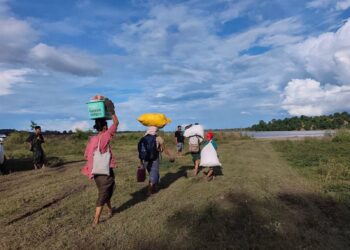Myanmar’s new gun ownership policy, which lets civilians bear arms, risks worsening conflict in the country, observers said.
The country has been ravaged by violence since the military took power in a coup more than two years ago.
The move could embolden pro-junta groups, and further bloodshed could hamper much-needed relief efforts after Cyclone Mocha battered western Myanmar on May 14.
The latest changes to the gun laws last month came as the army faces growing pressure to stamp out opposition in multiple battlegrounds.
Observers said the move is targeted at boosting the firepower of supporters of the junta, who fear being attacked.
SIGN OF DESPERATION
Experts said the new gun laws are a sign that the junta is under pressure to hold on to power.
Mr Aaron Connelly, senior fellow of Southeast Asian Politics and Foreign Policy at the International Institute for Strategic Studies, told CNA: “The military has never had to fight on so many fronts before. They are under pressure not just at multiple points along the periphery of the country, but also in the Bamar heartland in central Myanmar.”
He added: “These new gun laws appear to be an effort to create a legal mechanism to arm people who are supportive of the junta, in order to defend areas which they have taken back from the PDF (People’s Defence Force) or local defence forces.”
Ms Moe Thuzar, senior fellow and coordinator of the Myanmar Studies Programme at the ISEAS – Yusof Ishak Institute, said questions remain over who actually needs to use guns in the country.
“Looking back at past practice (and) past precedents, we do see that the people who were holding arms were either those that were very much close to or connected to the military authorities, or people who were military personnel or ex-military personnel, veterans and so on,” she noted.
For locals, the new policy adds another layer of fear to their lives. Many said there is no rule of law, and they feel unsafe even when doing basic daily chores such as going to the market.
Occasional attacks and assassinations on supporters of the junta have also occurred, even before the new gun law was introduced.
An urban guerrilla group, for instance, claimed responsibility for the death of an elections official in Yangon in April this year. He was a witness in the electoral fraud case surrounding ousted leader Aung San Suu Kyi.
Last month, a 58-year-old celebrity, known for being a staunch supporter of the Myanmar army, was gunned down near her home in Yangon.
Some owners of commercial buildings and shops are also concerned, saying they are still figuring out the relevant security processes and safety protocols, since they have never had to worry about weapons on their premises.
CYCLONE RELIEF
Meanwhile, Myanmar residents continue bearing the brunt in the aftermath of Cyclone Mocha, the worst natural disaster to hit the country since Cyclone Nargis in 2008.
There is a fear of politics coming into play as victims look to rebuild their lives with foreign aid, according to experts.
The ruling military government was already lacking in its response, only allowing international aid into the country after the crucial first weeks, slowing down relief efforts.
Ms Moe Thuzar said the junta has figured out “how that ASEAN space for humanitarian assistance could be used, manoeuvered (and) leveraged”.
One key difference between aid response for cyclones Nargis and Mocha is that this year’s disaster hit an area that is not entirely under the control of the governing State Administration Council (SAC), noted Mr Connelly.
“This is a more complicated situation because the Arakan Army or the ULA (United League of Arakan), its political arm, is in control of much of Rakhine State,” he said.
The Arakan Army is an armed ethnic group that has wrestled control of much of Rakhine State from the military junta.
MYANMAR JUNTA CONTROL
Some had hoped a ceasefire in place in Rakhine State would put a halt to the violence as relief efforts are rolled out.
However, Mr Connelly noted that even when flooding occurred in the cities of Sagaing and Magway, the SAC actually carried out more attacks in those places.
Resistance forces have also stepped up their offensives against the Myanmar army amid post-cyclone relief efforts.
As aid from ASEAN and the United Nations trickle into the country, there are concerns it would be politicised, with help going only to those selected by the Myanmar military.
The junta had also introduced a law late last year making the registration of non-governmental organisations compulsory.
Some fear the law would be used by the military as a tool to crush its opposition.
Source: CNA






